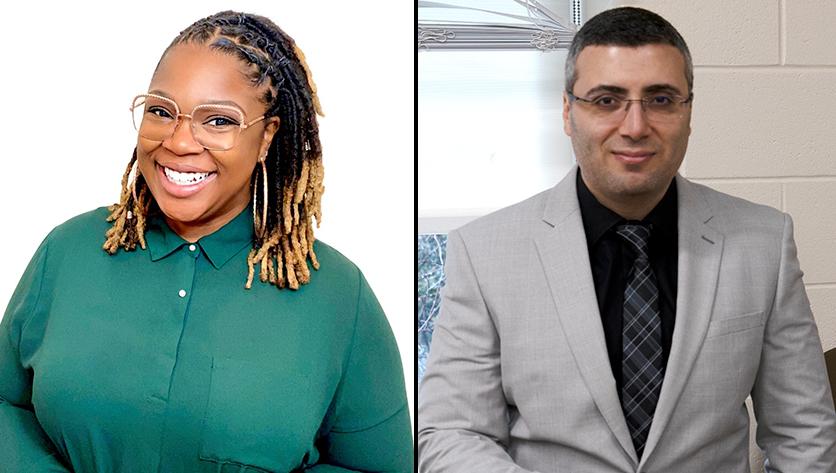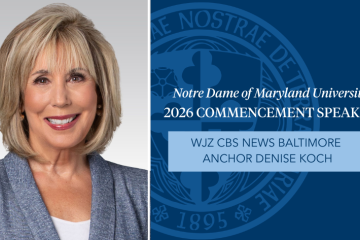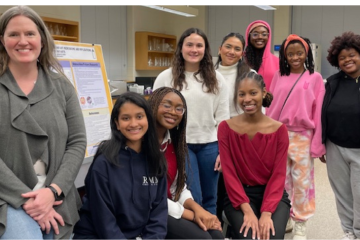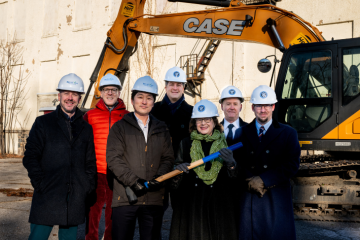Pharmacy Grads Return to NDMU as Faculty Members

By: Erik Pedersen, Senior Communications Manager
BALTIMORE – As Notre Dame of Maryland University’s School of Pharmacy celebrates the 10-year anniversary of graduating its first class of students back in 2013, some of the program’s alumni have returned to campus to help educate the next generation of future leaders in the profession.
Dr. Alyssia Dyett D’18 and Dr. Ahmed Eid D’15 work as assistant professors in the School of Pharmacy’s Department of Clinical and Administrative Sciences. During their time as students, each benefited from the close-knit community environment at NDMU which allowed them to form lasting connections with faculty members, and they now have the opportunity to make that same kind of impact on others.
“I received so much knowledge, mentorship and guidance from faculty members here,” Dr. Eid said. “They helped me become not just a better student, but a better person as well. I had always wanted to work in academia, and when I learned that the program was hiring, I thought it was a great way to give back to others some of what I had learned.”
“Looking back at my time in pharmacy school, those were some of the best years of my life,” Dr. Dyett added. “I decided during my third year that I wanted to come back here to teach. I had a few jobs between finishing my residency and returning, but everything I did during that time was focused coming back to Notre Dame.”
Sharing Her Knowledge
Dr. Dyett was hired for her current role in September 2021. She teaches on a variety of topics in the School of Pharmacy’s care lab sequence, including blood pressure measuring, immunizations, point of care testing and patient counseling, and she also educates on additional subjects in the school’s pharmacotherapeutic sequence.
Having taken the classes previously at Notre Dame, Dr. Dyett tries to use those experiences to teach the material in a way that best resonates with her students.
“I went through all of these courses,” she said. “I know what they’re supposed to look like, and I know how hard they can be. I’ve also reached out to former classmates to ask what worked for them and what they wish had been done differently, and I try to incorporate all of that feedback as I shape my lectures.”
The benefits of being an alumna extend beyond classroom settings as well.
“I’ve had students say that the library is too far away or too crowded,” Dr. Dyett explained. “And I’ll say, do you know there’s a secret study room on the third floor of Bunting? When we hire new faculty, I also try to orient them to some of the spots that might not be shown on a tour or easy to find on a map of campus. It’s been super helpful to be able to pull from that kind of background knowledge.”
Dr. Dyett comes from a strong teaching background. Both of her parents are college professors, and she served as a tutor for middle school, high school, and fellow pharmacy school students throughout her time at Notre Dame and as an undergraduate at nearby Towson University. When she decided that she wanted follow in her family’s footsteps and become a professor herself, she had plenty of mentors on NDMU’s staff who were ready to assist.
“The faculty here are very supportive of the students with whatever it is they want to accomplish,” Dr. Dyett said. “One faculty member in particular really helped coach me through the residency process, and she gave me advice on what activities and opportunities to seek out during residency to make yourself an appealing faculty candidate. It’s so valuable to have a strong support team when you’re going through a challenging program, and I’ve always felt that I’ve had that at Notre Dame.”
An Established Culture
When Dr. Eid decided to enroll as a student at NDMU, he was in the midst of a major career change. Born and raised in Egypt, he graduated from medical school in 2008, and he intended to work as a physician after moving overseas to Baltimore the following year.
Early on during his time in Maryland, however, Dr. Eid was introduced to clinical pharmacy while serving as a technician at Johns Hopkins Hospital. Clinical pharmacy was not practiced in Egypt at the time, and he was impressed by the amount of involvement that pharmacists were able to have in the care of patients.
Dr. Eid’s four years as a student affirmed that pharmacy was the right career for him, and they also created a lasting bond with NDMU’s School of Pharmacy.
“The culture here is what really drew me to Notre Dame as a student,” Dr. Eid said. “I came from an educational background where the class sizes were 20 times larger – you had your book, you had your lecture, and good luck. Here at NDMU, you are able to talk to the professors, you ask them questions, and you don’t leave until you’re fully understanding the material. I can’t tell how many times I walked into their offices, and they all knew me by my first name.”
Now, Dr. Eid is able to contribute to that culture from a different prospective after he was hired as an assistant professor last December. He will teach first through third year students in both the care lab and pharmacotherapeutic modules, and he will also assist fourth-year students as they review for their North American Pharmacist Licensure Examination (NAPLEX) certification exam.
Notre Dame has had a major impact on Dr. Eid’s life on both a professional and a personal level. He met his wife, Dr. Shefali Patel D’15, during his time as a student, and the pair spent six years working together at Johns Hopkins after graduation. Dr. Eid was a care coordination pharmacist, while Dr. Patel remains at Hopkins as a clinical pharmacy specialist. The chance to work at NDMU, though, as the University continues to expand its ability to serve the surrounding communities, inspired Dr. Eid to make another big career move.
“The amount of community involvement that has been established by the School of Pharmacy in a span of less than two decades is truly unbelievable,” he said. “And it’s not just us. Notre Dame started with a School of Nursing; now there is a School of Pharmacy, an Occupational Therapy Doctorate program, nurse practitioner programs, the list keeps growing.
“There are so many ways that we are trying to address healthcare inequalities and improve the well-being of citizens in Baltimore, the state of Maryland and beyond,” Dr. Eid concluded. “We’re making a difference, and that’s something I’ve always taken great pride in as a student and now as a professor.”
Established in 1895, Notre Dame of Maryland University (NDMU) is a private, Catholic institution in Baltimore, Maryland, with the mission to educate leaders to transform the world. Notre Dame has been named one of the best "Regional Universities North" by U.S. News & World Report.




